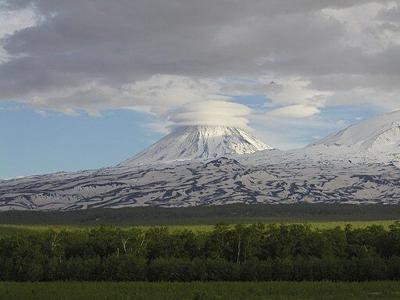The Klyuchevskoy volcano in Russia's Kamchatka Peninsula erupted shortly after an 8.8 magnitude earthquake shook the region. According to Live Science, the Geophysical Center of the Russian Academy of Sciences noted that the quake, one of the most powerful on record, likely intensified the eruption. Seismologists observed a “powerful glow” above the mountain as hot lava descended its slopes.
The volcano's eruption propelled ash 1.5 miles into the sky, with potential for explosions reaching up to 5 miles high, the Kamchatkan Volcanic Eruption Response Team reported to Live Science. This eruption is indicative of Klyuchevskoy's known volcanic activity patterns, as noted by the US Geological Survey (USGS). The area is positioned on the Pacific Ring of Fire, a hotspot for seismic and volcanic events
According to Live Science, even before the earthquake, scientists observed signs predicting the eruption. They discovered a lava lake at the volcano's summit, a classic indicator of an impending eruption.
Read More on Chicago Star
- Two of Frank Lloyd Wright’s earliest works are making real estate headlines
- Chicago artist puts his stamp on USPS 250th anniversary
- Chicago bids farewell to Ryne Sandberg, a legend etched in Cubs history
- French President sues Candace Owens over defamation regarding wife Brigitte Macron
Tsunami advisory for Hawaii now cancelled
As the earthquake's effects rippled across the globe, Hawaii faced a tsunami advisory. Warnings were issued for potential tsunami waves to reach more than 10 feet above normal tide levels, Hawaii News Now reported. Though the Pacific Tsunami Warning Center lifted the advisory hours later, the event stirred caution among locals.
According to Hawaii News Now, Chip McCreery of the Pacific Tsunami Warning Center emphasized, “While all-clear is given, persistent sea-level changes and strong currents pose risks.” The initial tsunami threat resulted in quick responses such as evacuation alerts and public safety warnings across Hawaii.
This sequence of events underscores the volatile nature of natural phenomena in the Pacific Ring of Fire. Both the earthquake and volcanic eruption serve as reminders of the powerful forces at play beneath our planet’s crust and emphasize the importance of monitoring geological activity for safety when disasters strike.








(0) comments
Welcome to the discussion.
Log In
Keep it Clean. Please avoid obscene, vulgar, lewd, racist or sexually-oriented language.
PLEASE TURN OFF YOUR CAPS LOCK.
Don't Threaten. Threats of harming another person will not be tolerated.
Be Truthful. Don't knowingly lie about anyone or anything.
Be Nice. No racism, sexism or any sort of -ism that is degrading to another person.
Be Proactive. Use the 'Report' link on each comment to let us know of abusive posts.
Share with Us. We'd love to hear eyewitness accounts, the history behind an article.